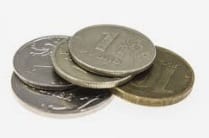Before entering fully into the meaning of the term nickel, it is necessary to know its etymological origin. In this case, we have to state that, although there are different theories in this regard, the most consolidated is the one that establishes that it derives from German, specifically from the word “nickel”, which can be translated as “devil”.
It should also be stated that this term was coined by the Swedish chemist Axel Fredrik Cronstedt (1722 – 1765). He created it after he managed to extract copper from nickelin in 1751 and obtained a white metal that he decided to call nickel.
Nickel is the chemical element whose symbol is Ni and its atomic number is 28 . Similar to silver in terms of its shine and tone, it is characterized by its tenacity, hardness and resistance to corrosion.
 Nickel can be found in minerals in combination with arsenic and sulfur. It has also been found in meteorites and is located in the Earth's core .
Nickel can be found in minerals in combination with arsenic and sulfur. It has also been found in meteorites and is located in the Earth's core .
A conductor of heat and electricity , nickel is a transition metal .
It is important to know that there are many foods that contain small amounts of nickel. However, there are others that are rich in it, such as fats and even chocolate. And it is necessary to take this detail into account because taking it in small proportions is necessary. However, consuming too much of it can be really harmful to your health.
Specifically, ingesting too much nickel can lead to respiratory failure, asthma, increased chances of suffering from lung or laryngeal cancer, heart problems...
In addition to everything indicated, we cannot ignore that it is considered that nickel began to be used by man around the 4th century BC.
Currently, the areas that have become the main nickel producers are considered to be Indonesia, the Philippines, New Caledonia, Russia, Australia, Canada and China. However, other corners of the world such as Cuba, Brazil or even Guatemala also stand out in this production.
One of the most common uses of nickel is the manufacture of coins . In the 19th century, the first coin made of this material was minted, although over time nickel began to be alloyed with copper to reduce costs. Already in the middle of the 20th century , nickel coins replaced silver coins.
In some countries , in fact, any coin is called nickel, regardless of the metal with which it was made and its value. In other nations, the nickel is specifically the nickel .
Nickel is also used in the development of electric batteries , in the production of stainless steels and in the coating of various surfaces .
The action of bathing a metal with a layer of nickel is called nickel plating . Nickel plating or nickel plating , meanwhile, is the act and consequence of nickel plating. Lastly, someone who is dedicated to nickel plating is known as a nickel plater .
